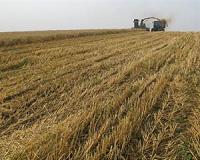 |
Denver CO (SPX) Mar 24, 2011 Two Rivers Water Company has announced that the Company has signed agreements to acquire an additional 1,000 acres of land adjacent to irrigated farmland it currently owns in Pueblo County, Colorado. In 2009, Two Rivers began implementing a plan to acquire and develop as much as 25,000 acres of irrigated farmland alongside a system of ditches and canals it owns in Pueblo County, Colorado. The land was previously productive farmland, producing grains, fruits and vegetables. But the land became fallow when farmers alongside the ditches were unable to get enough water to properly irrigate their crops, because of the shutdown of coal mines west of Walsenburg in the 1950s. As much as 30,000 acre feet of water per year had been a byproduct of the coal mines, explains John McKowen, CEO of Two Rivers: "The water was placed in the river and used to irrigate farms downstream. In addition, dams and other infrastructure were built to capture the water and redistribute it through our ditches for crop irrigation. When the coal mining stopped so did the farming." Two Rivers recently reassembled the infrastructure, which includes the capacity to store 70,000 acre feet of water. "Now, we are acquiring additional water rights to provide a more reliable water supply for our farm operations," says McKowen. "A new day is dawning for farmers in America," McKowen says. Developing countries need more grain to feed their burgeoning middle class populations. Higher standards of living around the world are increasing the demand for meat, which requires large amounts of feed. It adds up to rising prices for grain--and booming times for America's farmers, says McKowen. "America farms better than any other country on the planet. We are still the breadbasket to the world." Two Rivers estimates the cost of acquiring farmland, restoring the old storage and ditch systems, assembling additional water rights and installing modern irrigations systems on 25,000 acres will add up to more than $100 million. That's a big investment. But it's worth it, argues McKowen. "Irrigated farmland is a better investment than gold," he says. "The reason we have been able to attract capital for our development is not just because of the water, it's also because of our irrigated farming." Because of the geographically advantageous location of its infrastructure, Two Rivers expects to be able to assist cities like Pueblo, Colorado, if needed, with any potential spikes in demand during droughts through rotational fallowing of its farmland. Rotational fallowing of farmland is a practice whereby farmland is held back from production for a temporary time period and the water is diverted for municipal use. "Rotational fallowing is a concept that is gaining political support among parties trying to solve the balance between the need for food and the need for water. Two Rivers would like to contribute to the solution with resources it has that help offset municipal demand during critical periods but won't take farming out of production permanently," McKowen explains. Two Rivers is in the business of acquiring and developing water, and irrigated farming in Colorado and the Western U.S.
Share This Article With Planet Earth
Related Links - Farming Today - Suppliers and Technology
 Pakistan food prices too high: UN food relief agency
Pakistan food prices too high: UN food relief agencyGeneva (AFP) March 23, 2011 Pakistan's government has pushed food prices too high for an impoverished population, as malnutrition levels rise despite the recovery of crops after devastating floods, a UN food relief official said Wednesday. Wolfgang Herbinger, director for the World Food Programme (WFP) in Pakistan, said food crops especially wheat in the southern flood-hit plains were recovering fast with the prospect ... read more |
|
| The content herein, unless otherwise known to be public domain, are Copyright 1995-2010 - SpaceDaily. AFP and UPI Wire Stories are copyright Agence France-Presse and United Press International. ESA Portal Reports are copyright European Space Agency. All NASA sourced material is public domain. Additional copyrights may apply in whole or part to other bona fide parties. Advertising does not imply endorsement,agreement or approval of any opinions, statements or information provided by SpaceDaily on any Web page published or hosted by SpaceDaily. Privacy Statement |